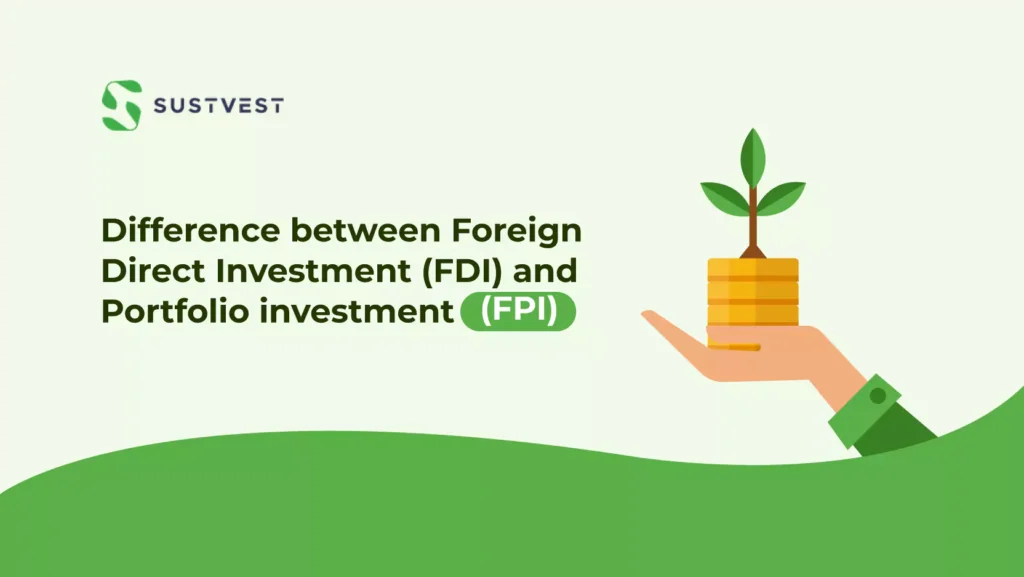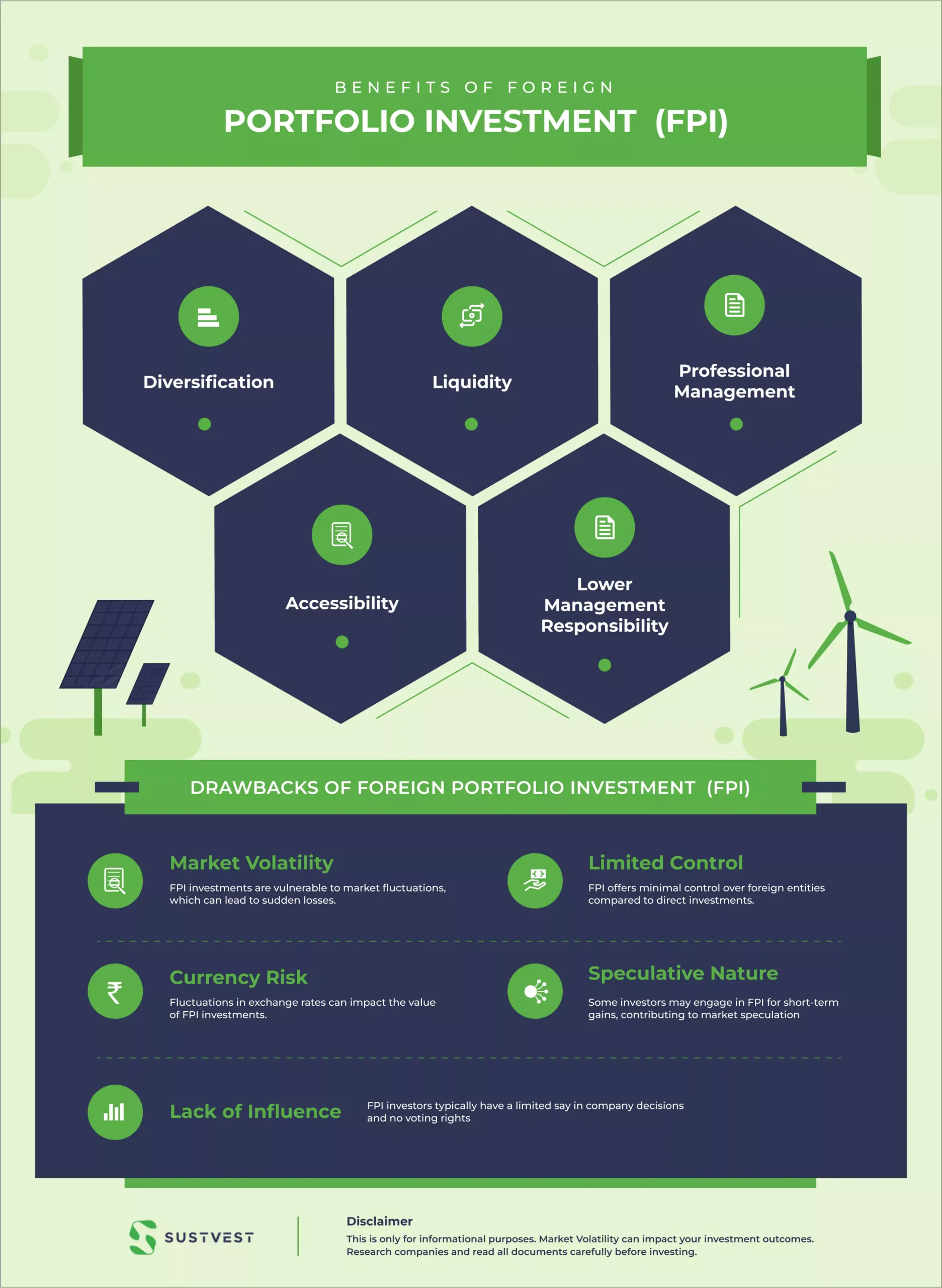In cutting-edge interconnected international, making an investment past borders has turned out to be more accessible than ever. people and institutions are exploring global investment possibilities to diversify their portfolios and probably increase their returns. common avenues for making an investment the world over are Foreign Direct Investment (FDI) and Foreign Portfolio Investment (FPI). these approaches to investing have their very own precise traits and goals. This comprehensive manual will shed mild on the differences between FDI and FPI, making those principles comprehensible for all of us.
Within the realm of international finance, FDI and FPI are vast strategies that cater to different investment desires. by means of the end of this manual, you’ll have a clear expertise of what sets those processes apart and which one would possibly align higher together with your investment targets.

What’s Foreign Direct Investment (FDI)?
Foreign direct investment (FDI) entails people, groups, or establishments making investments in the tangible assets or operational activities of a Foreign entity. The defining feature of FDI is the cause to set up a massive degree of manipulation or affect over the Foreign business.
Types of Foreign Direct Investment (FDI):
- Greenfield investment:
This form of FDI includes growing a new enterprise or subsidiary Foreign. It regularly includes building new centers, hiring neighborhood staff, and starting up sparkling operations.
- Mergers and Acquisitions (M&A):
FDI also can involve acquiring or merging with a current foreign commercial enterprise. This technique affords on-the-spot access to the Foreign marketplace and its purchaser base.
Foreign direct investment advantages and disadvantages:
Advantages of Foreign Direct Investment (FDI):
- Long-term Presence: FDI often indicates an extended-term dedication, enabling buyers to set up a solid foothold in foreign markets.
- Manipulate and have an impact on: Investors have giant manipulation over the Foreign business, allowing them to implement techniques and choices.
Disadvantages of Foreign Direct Investment (FDI):
- Higher chance: FDI can be riskier because of the good-sized capital funding and the complexities of navigating Foreign markets.
- Complexities: establishing and dealing with foreign operations can be complicated, stressful sizeable resources and information.
Foreign Portfolio Investment (FPI) – a better appearance
What is Foreign Portfolio Investment (FPI)?
Foreign Portfolio Investment (FPI) includes investing in economic property which includes shares, bonds, and other securities of Foreign entities without looking to gain substantial control or impact over these entities. FPI is characterized by its liquidity, allowing investors to buy and promote assets pretty speedy.
Benefits of Foreign Portfolio Investment (FPI):
- Diversification: FPI allows you to spread risk by investing in various assets and markets, reducing the impact of poor performance in one area.
- Liquidity: FPI investments are typically easy to buy and sell, providing flexibility to respond to changing market conditions.
- Professional Management: Expert fund managers handle FPI, making informed investment decisions on your behalf.
- Accessibility: FPI is accessible to a wide range of investors, regardless of their capital size.
- Lower Management Responsibility: You don’t need to manage or influence foreign businesses, making it a hands-off investment.
Drawbacks of Foreign Portfolio Investment (FPI):
- Market Volatility: FPI investments are vulnerable to market fluctuations, which can lead to sudden losses.
- Limited Control: FPI offers minimal control over foreign entities compared to direct investments.
- Currency Risk: Fluctuations in exchange rates can impact the value of FPI investments.
- Speculative Nature: Some investors may engage in FPI for short-term gains, contributing to market speculation.
- Lack of Influence: FPI investors typically have a limited say in company decisions and no voting rights.

In summary, of foreign direct investment vs. foreign portfolio investment, FPI offers diversification, liquidity, professional management, accessibility, and lower management responsibility. However, it comes with the risks of market volatility, limited control, currency fluctuations, speculation, and a lack of influence over foreign companies.
The Differentiate between foreign direct investment and portfolio investment:
Now, let’s differentiate between foreign direct investment and portfolio investment:
| Foreign Direct Investment | Foreign Portfolio Investment | |
| Stage of management | Includes a higher degree of management and control over foreign business operations. | It offers minimum to no management or an impact on the Foreign entities wherein investments are made. |
| Nature of investment | Investments are directed toward tangible assets or business operations out of the country. | Investments are targeted on financial assets, which include shares and bonds, without direct involvement in foreign enterprise management. |
| Long-term vs. Short-term | Commonly represents an extended-time period of dedication, with investors looking for sustained involvement in Foreign markets. | Frequently regarded as a short-term funding approach, with greater frequent buying and selling of belongings. |
| Risk and Complexity | Includes better hazard and complexity because of substantial capital funding and direct management obligations. | Generally contains a lower chance and is less complex because it does not involve direct management over Foreign companies. |
FAQs
Q1. What’s Foreign portfolio funding (FPI)?
A1. Foreign Portfolio funding (FPI) entails investing in the economic property of Foreign entities, inclusive of shares and bonds, without looking for extensive manipulation or effect over the Foreign organizations.
Q2. What is an FDI investor?
An FDI investor is a person, business enterprise, or organization that invests in a foreign country with the intention of obtaining a sizeable degree of control or impact over a Foreign enterprise.
Q3. Must you spend money on a Foreign portfolio with an FPI?
Investing in Foreign portfolios via FPI can be a suitable method for diversifying your investment portfolio and gaining exposure to international markets, in particular in case you select an extra liquid and much less palms-on technique.
Q4. What is foreign direct funding (FDI)?
Foreign Direct funding (FDI) refers to investments made by using individuals, companies, or establishments in tangible property or commercial enterprise operations positioned in another country, to gain control or have an effect on the foreign enterprise.
Q5. What are the examples of FDI and FPI?
Examples of FDI encompass a multinational employer setting up a subsidiary in a foreign country or obtaining a Foreign business enterprise. Examples of FPI include shopping stocks of foreign organizations indexed on international stock exchanges or investing in Foreign authority’s bonds.
Conclusion
In this blog, we have differentiated between Foreign Direct Investment (FDI) and Foreign Portfolio Investment (FPI) is important for making informed investment selections. FDI includes a better degree of manipulation and long-term dedication, at the same time as FPI offers diversification and liquidity with decreased control obligations.
To differentiate between foreign direct investment and portfolio investment you need to align the factors with your financial goals, risk tolerance, and funding preferences. Each strategy has its deserves and downsides, making them suitable for extraordinary investment strategies. Contact Sustvest for more financial information related to portfolio investment strategies.

Founder of Sustvest
Hardik completed his B.Tech from BITS Pilani. Keeping the current global scenario, the growth of renewable energy in mind, and people looking for investment opportunities in mind he founded SustVest ( formerly, Solar Grid X ) in 2018. This venture led him to achieve the ‘Emerging Fintech Talent of the Year in MENA region ‘ in October 2019.




